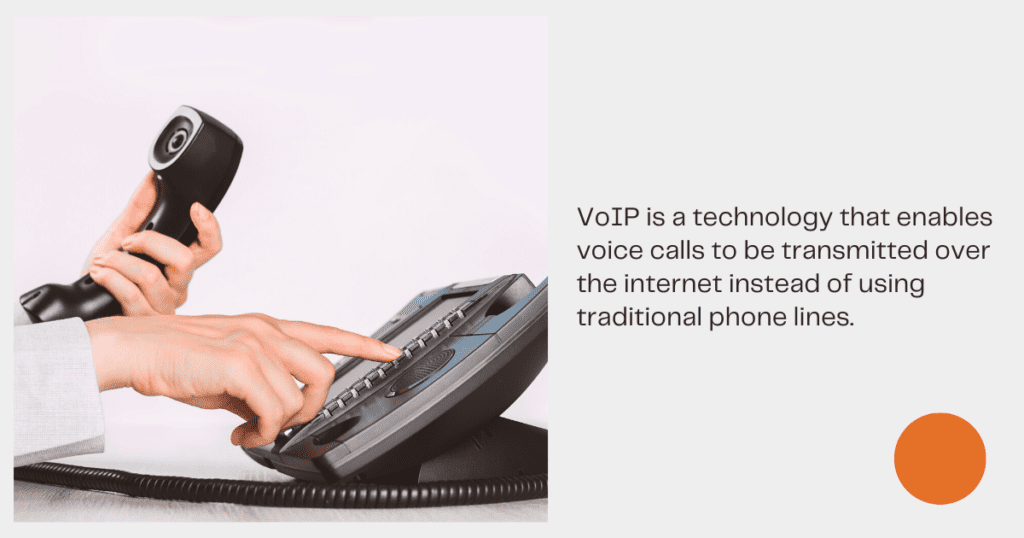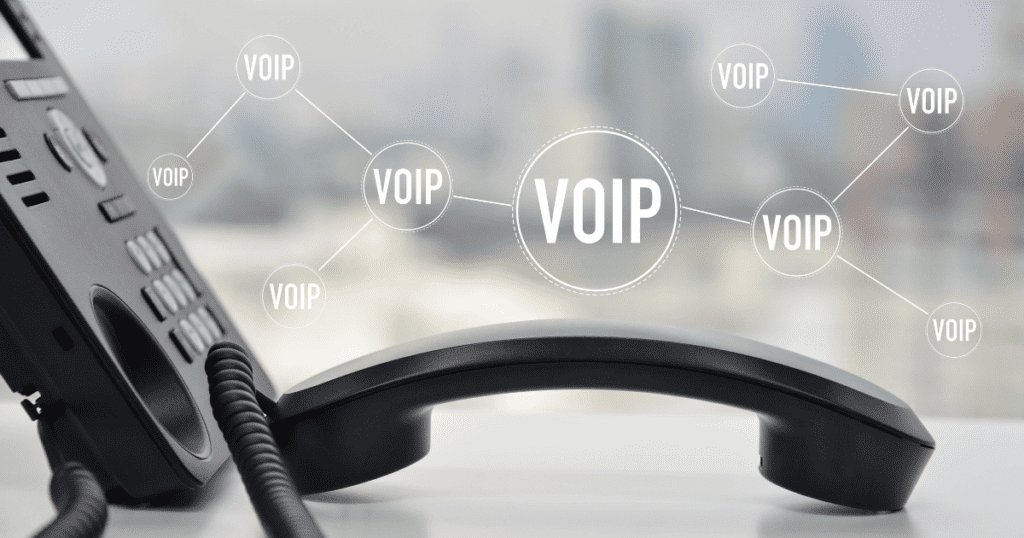Voice over Internet Protocol (VoIP) is a technology that allows you to make voice calls over the internet instead of using traditional phone lines. This technology has revolutionized the way people communicate, especially in business settings. This article will explore the most common questions about using VoIP for business. Our topics include:
- What is VoIP?
- How does VoIP work?
- What equipment do you need for VoIP?
- How does VoIP compare to landlines?
- What are the advantages of VoIP?
- What are some important features of VoIP for business?
- Is VoIP expensive?
- What are the benefits of VoIP for business?
- How do I choose a VoIP provider?
- Is it difficult to switch to VoIP?
We’ve got a lot to cover, so let’s dive right in!
What is VoIP?

As mentioned earlier, VoIP is a technology that enables voice calls to be transmitted over the internet instead of using traditional phone lines. This technology converts analog voice signals into digital signals transmitted over the internet. VoIP uses various technologies to ensure high-quality voice communication, including compression algorithms, packet switching, and Quality of Service (QoS) protocols.
How does VoIP work?
VoIP works by converting analog voice signals into digital signals that can be transmitted over the internet. To do this, VoIP uses digitization, which involves converting sound waves into a series of 1s and 0s that can be transmitted over the internet. This process involves three steps:
- Encoding: The analog voice signal is sampled at regular intervals, and each sample is assigned a binary value based on its amplitude.
- Compression: The binary values are then compressed using codecs, which remove redundant information and reduce the size of the digital signal.
- Packetization: The compressed digital signal is then divided into packets transmitted over the internet using packet-switched networks.
When a VoIP call is initiated, the caller’s voice is first converted into a digital signal using the above process. The digital signal is then transmitted over the internet to the recipient’s device, which is converted back into an analog voice signal using the same process in reverse.
What equipment do you need for VoIP?
Setting up a VoIP system is relatively simple, and you only need a few pieces of equipment. First, you’ll need a broadband internet connection, such as cable or DSL. You’ll also need a computer, specialized VoIP phone, or adapter to connect your traditional phone to the VoIP service. When you partner with Clarity Voice, we’ll guide you in selecting the right equipment for your business needs. You don’t have to be a tech expert—we make getting started with VoIP easy.
How does VoIP compare to landlines?

VoIP is a modern phone system that offers several advantages over traditional landlines. We’ll address these below, but they include cost savings, flexibility, and advanced features that improve productivity and customer experience. From a user standpoint, using a VoIP phone is similar to using a traditional landline. In addition to making calls on a specialized VoIP phone, many VoIP providers offer mobile or desktop apps that allow you to make and receive calls from your computer or smartphone. For example, click here to learn about the Clarity Voice Office Anywhere smartphone app.
What are the advantages of VoIP?
VoIP offers several advantages over traditional phone systems, including:
- Cost Savings: VoIP is typically much cheaper than conventional phone systems, and many providers offer unlimited calling plans for a flat monthly fee.
- Flexibility: VoIP can be used from any device with an internet connection, including smartphones, tablets, and laptops. This improves the mobility of your staff and is a major reason why VoIP for business is so popular.
- Scalability: VoIP services can be easily scaled up or down to accommodate business needs and growth.
- Rich Features: VoIP offers a range of advanced features that can help improve communication and customer experience (we cover some of these below).
- High-Quality Audio: VoIP technology (such as Quality of Service, QoS) optimizes internet bandwidth to prioritize crystal clear calls.
What are some important features of VoIP for business?

VoIP offers many features that can benefit businesses of all sizes. Here are some important features to be aware of.
- Auto Attendant: This feature provides an automated greeting and routing system for incoming calls, which can save time and improve the customer experience.
- Call Forwarding: VoIP lets you easily forward calls to other devices or employees, making it easy to stay connected and never miss an important call.
- Voicemail-to-Email (or Text): This feature automatically transcribes voicemail messages and sends them to your email or text, allowing you to keep track of important messages and respond quickly.
- Call Recording: VoIP allows you to easily record calls, which can be useful for training, quality control, or legal compliance.
- Analytics and Reporting: VoIP provides valuable data on call volume, call duration, and other metrics, which can be used to optimize business processes and improve customer service.
These are just a few of the many features of VoIP. When choosing a VoIP provider, it’s important to consider which features are most important for your specific business. Need some help? The Clarity Voice team is happy to discuss features and set you up with a VoIP solution to help you reach your business goals.
Is VoIP expensive?
VoIP is a cost-effective alternative to traditional landline phone service. Many VoIP providers offer unlimited calling plans for a flat monthly fee, which can be a great option for businesses with high call volume. The cost of VoIP can vary depending on factors like the number of users and the features required. On average, a basic VoIP service plan can range from $10 to $25 per user per month, while a premium plan with advanced features can range from $35 to $50 per user per month. It’s important to compare pricing and features among VoIP providers to find the best fit for your needs and budget. Additionally, businesses may need to invest in equipment like VoIP phones or adapters, which can add to the initial setup cost. However, over time, the cost savings from using VoIP can be significant.
Curious about Clarity Voice VoIP pricing? Check out this page.
What are the benefits of VoIP for business?

VoIP has significantly impacted business communication. We’ve already mentioned benefits like cost savings and flexibility. Here are some other reasons why businesses love VoIP.
- Improved Communication: VoIP offers a range of advanced features that will enhance business communication and make it easier for employees to work together, regardless of location.
- Better Customer Service: VoIP allows businesses to route calls more efficiently, ensuring customers are quickly connected with the right person.
- Enhanced Productivity: VoIP offers a range of features that can help improve productivity, such as call forwarding and voicemail-to-email (or text). VoIP also increases mobility by allowing employees to stay connected even when away from their desks.
How do I choose a VoIP provider?
Choosing the right VoIP provider is important for your business, as it impacts your communication capabilities and overall productivity. Here are some factors to consider when selecting a VoIP provider:
- Features: You’ll want to find a provider that offers the features that are important to your business.
- Reliability: Ensure the provider has a reliable network with minimal downtime and quick resolution times for any issues.
- Customer Support: Find a provider that offers 24/7 customer support, preferably with a dedicated account manager.
- Integration: If you use other business tools like CRM software, look for a VoIP provider that integrates with those tools.
Considering these factors, you can choose a VoIP provider that meets your needs and helps you achieve your business goals.
Is it difficult to switch to VoIP?
Switching to VoIP can be straightforward, especially if you choose a provider offering dedicated support and guidance throughout the transition.
Clarity Voice makes it as easy as possible for customers to switch to VoIP. We’ll help you set up the necessary equipment, port your existing phone numbers, and configure your settings to ensure a smooth transition. Additionally, we offer training and resources to help users get up to speed quickly. With support from the Clarity Voice team, switching to VoIP can be a simple and beneficial move for your business.
Ready to Make the Switch?
In this article, we’ve answered the most frequently asked questions business owners have about VoIP phone systems, including what is VoIP and the benefits of VoIP for business. If you have further questions or are ready to switch, we’d love to hear from you! Learn more about our industry-specific VoIP solutions like DealerPhones®, PizzaPhones®, and FranchisePhones®, and then go here to get a quote, request a demo, or just say hi.



